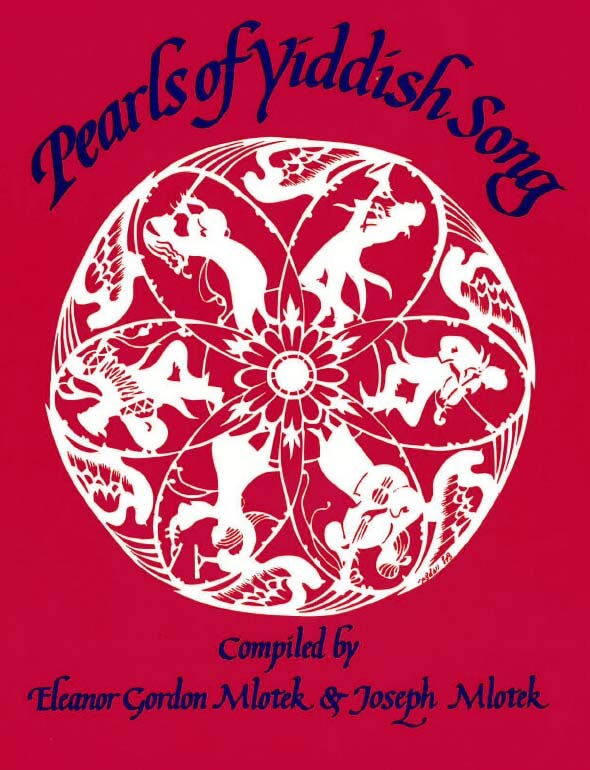Excerpt of song entitled “Mamenyu” or “Elegy for the Triangle Fire Victims.” Words by Anshel Schorr (1871-1942); music by Joseph Runishinsky (1881-1956). Published in sheet music by the Hebrew Publishing Co., N.Y., 1911. The song without reference to the Triangle Fire appeared in the operetta Dos meydl fun der west (The Girl of the West), produced in 1910-1912 in New York and called Di amerikanerin (The American Girl) in Europe. In the published song sheet, stanzas were added about the Triangle Fire which occurred on March 25, 1911. The elegy was revived in the Off-Broadway musical The Golden Land (1982-87).

Your heart is torn by the terrible disaster.
The Jews grieve and weep and wring their hands.
A fire breaks out, oh, in the light of day and hundreds of workers are burned to death.
Those who tried to flee the fire found death by leaping.
The morgue is full. You can become plain crazy as a mother grieves quietly.
Refrain:
— Oh, woe, my dear child! the mother tears at her hair.
— For a piece of bread, a horrible death robbed me of my only child.
My daughter lies dead in a shroud instead of a wedding dress.
Woe to my life, a child of sixteen! Oh, mother, mother, woe is me!
Es rayst dos harts fun der shreklekher plog,
S’yidishe folk klogt un veynt, un brekht di hent.
Es brekht oys a fayer, oy, in heln tog
Un hunderter arbeter, zey vern farbrent.
Di vos zaynen fun fayer antrlnen.
Hobn shpringendik zey’r toyt gefinen.
Di “morg” iz fil,*
Men vert shir dil,
Vi a mame klogt dort in der shtil:
Refrain:
— Oy vey, kindenyu!
Rayst zikh bay di hor di mamenyu,
— Tsulib dem shtikl broyt
Hot a shreklekher toyt
Geroybt mir mayn eyntsik kind;
Toyt ligt mayn meydele,
Takhrikhim shtot a khupe-kleydele.
Vey iz mayne yor,
A kind fun zekhtsn yor,
Oy, mame, mame, vey iz mir!
*ful
עס רײַסט דאָס האַרץ פֿון דער שרעקלעכער פּלאָג,
ס’ייִדישע פֿאָלק קלאָגט און װײנט, און ברעכט די הענט.
עס ברעכט אױס אַ פֿײַער, אױ, אין העלן טאָג
און הונדערטער אַרבעטער, זײ װערן פֿאַרברענט.
די װאָס זײַנען פֿון פֿײַער אַנטרונען
האָבן שפּרינגענדיק זײער טױט געפֿונען.
די מאָרג איז פֿיל,*
מען װערט שיעור דיל,
װי אַ מאַמע קלאָגט דאָרט אין דער שטיל:
רעפֿרײן:
— אױ־װײ, קינדעניו!
רײַסט זיך בײַ די האָר די מאַמעניו,
— צוליב דעם שטיקל ברױט
האָט אַ שרעקלעכער טױט
גערױבט מיר מײַן אײנציק קינד;
טױט ליגט מײַן מײדעלע,
תּכריכים שטאָט אַ חופּה־קלײדעלע,
װײ איז מײנע יאָר,
אַ קינד פֿון זעכצן יאָר,
אױ, מאַמע, מאַמע, װײ איז מיר!
* פֿול
Song Title: Lid Fun Trayengl-Fayer

First published in 1988 as Pearls of Yiddish Song: Favorite Folk, Art and Theatre Songs, this anthology contains 115 songs. Some material had never been published, while others, included in rare song collections or sheet music, were largely inaccessible. The songs presented reflect Jewish life in Eastern Europe and the United States and depict childhood, love, family celebrations, poverty, work and struggle. There are also songs from the Hasidic and Maskilic movements, songs of Zion and of America, as well as songs from the Yiddish theater.
The title of this anthology derives from the weekly two-page feature column “Pearls of Yiddish Poetry,” which the compilers Yosl and Chana Mlotek initiated in 1970 in the Yiddish newspaper Der Forvertz (the Yiddish Daily Forward). Hundreds of readers from around the world — including authors, composers, singers, actors — became co-participants in this collective folk project and recalled melodies, lines, fragments, stanzas and their variants of songs, poems, and plays which they had heard in their youth. At first, readers sent in only written material. Later, they also taped songs on cassettes, many of whose melodies had, until then, never been recorded. They also identified and supplied missing information regarding lyricists, poets, and composers and described the circumstances surrounding the songs’ origins, their dissemination, diffusion and impact.